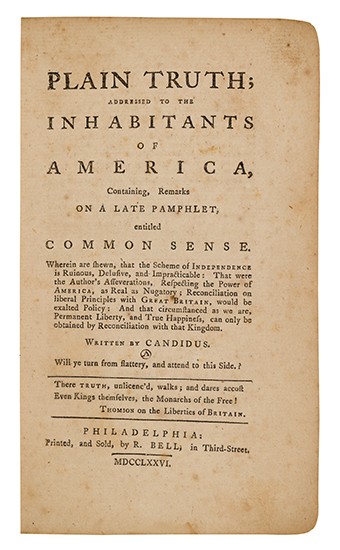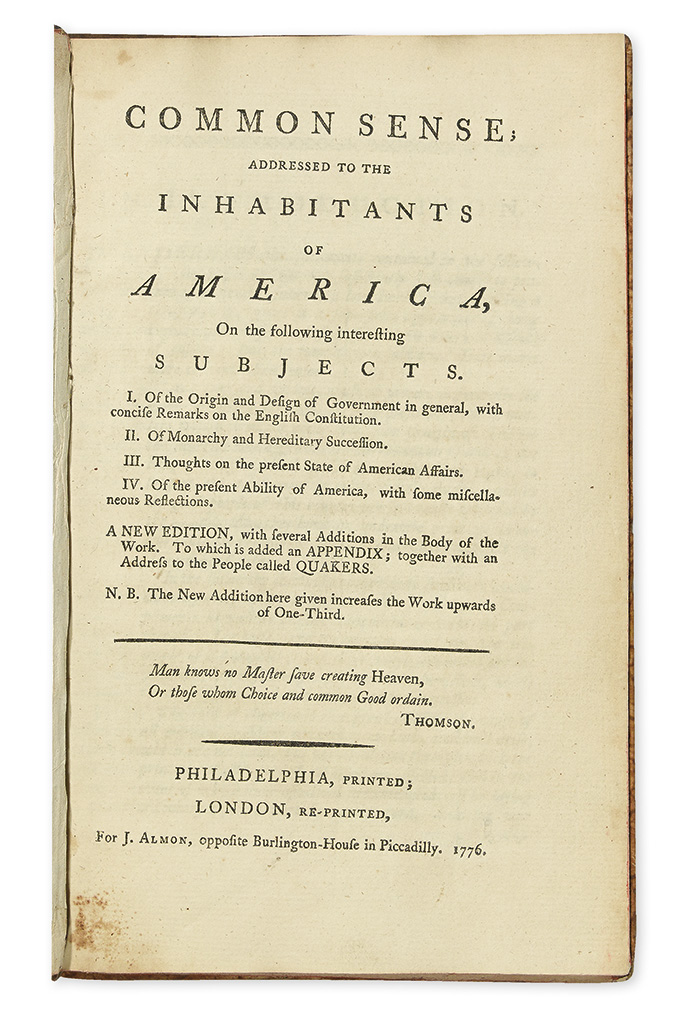CHALMERS, James (1727-1806)]. Plain Truth; Addressed to the Inhabitants of America, Containing Remarks on a Late Pamphlet entitled Common Sense...Written by Candidus . Philadelphia: R. Bell, 1776. 2 parts in one, 8 o in 4s (208 x 121 mm). (Lacking half-title, first and last leaves a bit browned, some scattered spotting.) Modern brown morocco-backed boards. FIRST EDITION of this Loyalist reply to Thomas Paine, issue including the Additions to Plain Truth at end. The additions were issued separately on April 17th, after the first part appeared on March 13th, though the two sections are also found issued together as here. At the end of the first part is an extract of a reply to Common Sense signed "Cato." Thomas R. Adams notes that at various times the work has been attributed to Smith, George Chalmers Charles Inglis, Richard Wells, Joseph Galloway and Alexander Hamilton. Evidence suggests that it was in fact James Chalmers who authored the work; letters reveal that he sent a copy to British commander Sir Henry Clinton, and in his memorial to the British Audit Office in 1784 he mentions that he wrote Plain Truth ; in addition, Chalmers quotes from his own pamphlet in a 1796 attack on his old adversary, Thomas Paine. Chalmers was a wealthy planter from Kent County, Maryland. While Paine favored simple, direct language, Chalmers' prose is rich with literary and historical references. Chalmers made an important and often overlooked observation: he found it illogical for any foreign power to side with the colonists against England: "Can we be so deluded, to expect aid from those princes (France and Spain), which inspiring their subjects with a relish for liberty, might eventually shake their arbitrary thrones...Can we believe that those princes will offer an example so dangerous to their subjects and colonies...?" Chalmers points out the great debt the colonists owe to England, and provides an argument against democracies, which historically had not always survived. American Controversy 76-19a (first issue, without Additions ); American Independence 208c; Evans 15088; Sabin 84642 note.
CHALMERS, James (1727-1806)]. Plain Truth; Addressed to the Inhabitants of America, Containing Remarks on a Late Pamphlet entitled Common Sense...Written by Candidus . Philadelphia: R. Bell, 1776. 2 parts in one, 8 o in 4s (208 x 121 mm). (Lacking half-title, first and last leaves a bit browned, some scattered spotting.) Modern brown morocco-backed boards. FIRST EDITION of this Loyalist reply to Thomas Paine, issue including the Additions to Plain Truth at end. The additions were issued separately on April 17th, after the first part appeared on March 13th, though the two sections are also found issued together as here. At the end of the first part is an extract of a reply to Common Sense signed "Cato." Thomas R. Adams notes that at various times the work has been attributed to Smith, George Chalmers Charles Inglis, Richard Wells, Joseph Galloway and Alexander Hamilton. Evidence suggests that it was in fact James Chalmers who authored the work; letters reveal that he sent a copy to British commander Sir Henry Clinton, and in his memorial to the British Audit Office in 1784 he mentions that he wrote Plain Truth ; in addition, Chalmers quotes from his own pamphlet in a 1796 attack on his old adversary, Thomas Paine. Chalmers was a wealthy planter from Kent County, Maryland. While Paine favored simple, direct language, Chalmers' prose is rich with literary and historical references. Chalmers made an important and often overlooked observation: he found it illogical for any foreign power to side with the colonists against England: "Can we be so deluded, to expect aid from those princes (France and Spain), which inspiring their subjects with a relish for liberty, might eventually shake their arbitrary thrones...Can we believe that those princes will offer an example so dangerous to their subjects and colonies...?" Chalmers points out the great debt the colonists owe to England, and provides an argument against democracies, which historically had not always survived. American Controversy 76-19a (first issue, without Additions ); American Independence 208c; Evans 15088; Sabin 84642 note.






Testen Sie LotSearch und seine Premium-Features 7 Tage - ohne Kosten!
Lassen Sie sich automatisch über neue Objekte in kommenden Auktionen benachrichtigen.
Suchauftrag anlegen